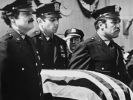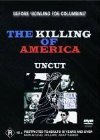Eye For Film >> Movies >> The Killing Of America (1981) Film Review
The Killing Of America
Reviewed by: Jennie Kermode

If one looks at the statistics, the US has the 14th highest per capita murder rate of any country, and the highest of all in proportion to its GDP. In 2015, 13,286 people were killed there by shooting alone, and there were 64 school shooting incidents. Compare this with the UK, where the murder rate is 18 times lower - or with Canada, another nation where personal possession of firearms is common, where it's 23 times lower - and it's hard to avoid the conclusion that something strange is going on. But what?
First screened in 1982 but, to date, never given a full US release, Sheldon Renan and Leonard Schrader's coruscating montage of crime footage attempts to resensitise viewers to the impact of all this violence. They trace it from the Kennedy assassination - not a bad choice, as there was a dramatic spike in US homicide rates between then and 1970, but a bit dubious in terms of causation. What they do very well, though, is to capture trends in types of homicide - hostage related incidents, sniper attacks and so on - which indirectly make a case for copycat phenomena playing a significant role. Was the death of JFK such a traumatic event for America that it unleashed a tide of violence still manifest today?

Despite Chuck Riley's extensive narration - in a booming US crime reporter style that will seem somewhat camp to viewers elsewhere - not much effort is made to develop the argument; rather, we are assailed by a montage of images, killing after killing, shocking viewers into perceiving a historical progression that may or may not be rationally justified. Some effort has been made to avoid complicating the issue with politics, so there are relatively few examples of racially motivated killings. Whilst this approach is understandable, it's unclear how much can be meaningfully said about violence in America without considering the lasting sociological impact of slavery and segregation. There's also an assumption here that the police are always on the side of good, which creates a political slant by omission and mars this clearly as a historical piece with a very different perspective from that of many Americans today.
The sheer wealth of archival material assembled here, however, is staggering, and even where the film touches on familiar crimes we often see them from unfamiliar angles, with little-used footage inviting a fresh assessment. The newsreel footage of JFK's death is characterised by a focus on his young wife, her pink dress the only clear indicator of which car it is being rushed to a hospital. We hear about her recent loss of a child and see her two remaining children carefully posed for the cameras at their father's funeral. It's these personal touches that bring the film to life and, in doing so, remind us that each killing represents the loss of a life, so though we witness fewer than take place in the US in a single week, the cumulative effect is powerful.
Just as there are famous victims, there are famous killers: David Berkowitz, Ted Bundy, John Wayne Gacy. again, the filmmakers dwell on less celebrated details, reinforcing the ugliness of their crimes. Skulls fractured, teeth knocked out, shoulders dislocated. A visit to Jonestown takes in crates of kool aid, shows us happy followers dancing before it all went wrong. "The babies were first," recounts Riley. A man who killed his mother reminisces about the years when he murdered young women, describing a great weight of violence within him that had to come out somehow, describing how he tried to stop. Most of the killers are male, white, above average IQ; but we see the aftermath of an attack on elementary school children by a teenage girl, hear about the teacher she shot dead as he tried to save them.
Whilst it may not be the sharpest piece of sociological analysis, The Killing Of America has an important point to make about the level of brutality Americans have come to take for granted, and, in making that point through the medium of news footage, it tells us something about how the normalisation process has occurred. The world seems a long way now from the heady optimism of the Kennedy days. Perhaps illusions matter. Perhaps cinema like this has a role to play in shaping national stories too.
Reviewed on: 26 Aug 2016

















